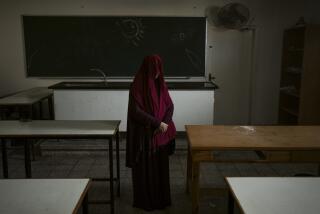‘There Was Always Blood on the Floor,’ Ex-Prisoner Says
- Share via
PRIZREN, Yugoslavia — Abdurahim Spahiu’s close-cropped hair, hollow cheeks and haunted eyes mark him.
He is a former prisoner, kept for two months and three days in jail here with hundreds of other ethnic Albanians who say they were starved and tortured during the worst of the campaign to “ethnically cleanse” Kosovo.
Spahiu, who was rescued last week by German troops taking part in NATO-led peacekeeping operations, was among the thousands of ethnic Albanians--most of them young men--who were arrested on suspicion of being Kosovo Liberation Army members or supporters.
Once arrested, the prisoners were in for brutal treatment. People living near the Prizren Commune Prison, not far from the center of this historic city in southern Kosovo--a province of Serbia, the dominant Yugoslav republic--said they were kept awake at night by the agonizing screams of inmates who were being beaten.
“On the 10th of April, they arrested me from my home and accused me of terrorism,” said Spahiu, recounting his experience. “I was beaten three times a day. Food was a piece of bread, marmalade and tea.”
The 43-year-old amateur ham radio operator, who until late March had been trusted enough to be the only ethnic Albanian working in Prizren’s office of civil defense, was thrown into a room about 60 square feet in size with 30 other men. Their only toilet was a bucket emptied once a day. Many of the prisoners became sick. Prisoners who were beaten were sometimes unconscious for days, Spahiu said.
The beatings took place in a corridor, Spahiu said. He would be forced onto the floor on his stomach. Guards would lift up the soles of his feet to beat them with sticks, and punch and kick the area of his kidneys.
“There was always blood on the floor,” he said. “They forced us to sing Serbian songs. Or they would make a cross with blood on your forehead and draw the four Cs [a Serbian nationalist symbol that means ‘Only Unity Can Save the Serbs’].”
And, he said, they threatened, “If you wash it, we will beat you again.”
The guards seemed to enjoy the beatings, Spahiu said, and sometimes soldiers or paramilitary forces from the town asked to join in.
“Everyone was drunk, and they treated it as a good chance to beat Albanians,” he recalled. “If they got news that some soldier or some policeman had died, they would come inside to beat us.”
Spahiu’s troubles started with the North Atlantic Treaty Organization bombing campaign, which began March 24. He was told that he could no longer work. Two and a half weeks later, he was arrested and accused of having contacts with the KLA, which he denies.
The ordeal lasted until June 13, the day German troops reached Prizren. Spahiu was loaded onto a tarp-covered truck, among 13 prisoners who constituted the last group scheduled for transfer to another part of Serbia. But on that day, as Yugoslav troops were assembling to vacate Kosovo, the ethnic Albanians of the city gingerly emerged onto the streets to welcome NATO forces.
Residents alerted NATO troops that the truck contained prisoners. The Germans intervened and ordered the Serbs to drive on without their human cargo.
Spahiu, who believes that the rescue may have saved his life, feels a duty to the at least 290 prisoners from Prizren who were transferred to Prokuplje, Serbia, before the Germans arrived.
“If only I can do something for my friends,” he said.
Twice in recent days, he has helped lead demonstrations outside NATO’s headquarters in Prizren asking for international assistance to gain the return of the prisoners. In what was the city’s first legal protest by ethnic Albanians in years, about 400 people walked silently through the town holding up signs in English and German calling on NATO and the Red Cross to get back their loved ones.
More to Read
Sign up for Essential California
The most important California stories and recommendations in your inbox every morning.
You may occasionally receive promotional content from the Los Angeles Times.













